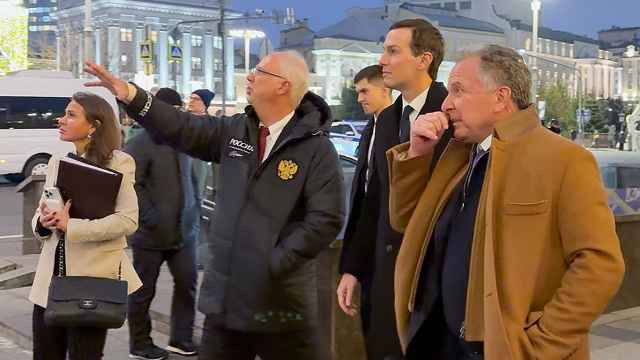Billionaire Alexander Nesis said Thursday that his Nomos Bank may sell shares to the public next year to help meet domestic demand for financing.
“An IPO makes sense to boost owners equity to stay in compliance with state requirements as the business grows,” Nesis said in an interview. “We are studying such an opportunity, while no decision has been taken yet.”
Nomos, Russia’s sixth-largest nonstate lender, has borrowed $850 million from foreign banks this year as it increases lending to domestic households and businesses and acquires a regional lender. Nesis’ ICT Group owns about 52 percent of Nomos, while Czech billionaire Petr Kellner controls 28.5 percent and J&T Group has 19 percent.
Nesis is also a shareholder in precious metals miner Polymetal and potash producer Uralkali.
Russian bank lending to individuals has increased for eight-straight months, while loans to companies have climbed for seven, according to Central Bank data. Demand for financing began to recover at the end of the first quarter, after the economy shrank 7.9 percent in 2009, the most on record.
Nomos will have to compete for investors if it goes ahead with an IPO in 2011. VTB Capital, the nation’s biggest equity underwriter, expects Russian companies including state and private banks to sell as much as $28 billion of shares publicly next year, the most since 2007, after the country’s benchmark index regained the bulk of its record decline.
Nesis said Nomos would have about 450 billion rubles ($14.3 billion) of assets by the end of the year, after it completes the acquisition of Khanty-Mansiisk Bank, a lender in the eponymous Siberian oil province. That would make Nomos Russia’s largest nonstate lender after Alfa Bank and Promsvyazbank, according to Kommersant Dengi magazine.
Nomos expects assets to grow 27 percent next year to about $18 billion on increased lending, Nesis said.
“If our return on equity is below this percent, it means we’ll have to increase shareholder equity so it doesn’t fall below the required threshold of at least 12 percent of the bank’s liabilities,” Nesis said.
Nesis also said he planned to spend $1 billion on a railcar factory project to meet domestic demand for transporting raw materials from mines and smelters.
“We reckon upon a simple thing,” he said. “Russia has one of the largest railcar fleets in the world, and the majority of these are old and need to be replaced soon.”
Nesis’s ICT Group will invest the money in the Tikhvin railcar factory that’s set to begin annual output of at least 10,000 vehicles from the second half of 2011. The plant in Tikhvin, in the Leningrad region, northwest Russia, may sell shares through an initial public offering at some point, Nesis said.
Russia has about 1 million railcars in operation, according to Brunswick Rail Leasing, while private cargo carriers are building up their own fleets. State-owned vehicles have a lifespan of about 20 years, according to Russian Railways.
The Tikhvin plant says it signed long-term contracts with Russian Railways subsidiaries and private operators including Transgarant. The factory will employ 3,500 people, about a quarter of the workers used in Russian facilities that have similar production volumes, Nesis said. The company built a new operation at the site of a Soviet-era producer of tractors using technology from Wabtec Corporation of the United States.
“We decided to spend $200 million on building apartments in Tikhvin to attract workers from other regions,” Nesis said. “We are offering them houses, mortgage loans and the work that allows them to repay these loans.”
Nesis and his partners control about 24 percent of Polymetal, Russia’s largest silver producer, and 13 percent of Uralkali. Those stakes are worth about $3.3 billion combined.
Forbes magazine in May ranked Nesis the 44th richest Russian, with a fortune of $1.4 billion.
Brunswick Rail Limited, a freight leasing company operating in Russia, raised $500 million in equity, mezzanine and debt financing to boost its freight railcar fleet, the company said in a statement Thursday.
State development bank VEB invested $60 million, while the European Bank for Reconstruction and Development and International Finance Corporation led two syndicates of $200 million and $100 million, respectively, the statement said.
A Message from The Moscow Times:
Dear readers,
We are facing unprecedented challenges. Russia's Prosecutor General's Office has designated The Moscow Times as an "undesirable" organization, criminalizing our work and putting our staff at risk of prosecution. This follows our earlier unjust labeling as a "foreign agent."
These actions are direct attempts to silence independent journalism in Russia. The authorities claim our work "discredits the decisions of the Russian leadership." We see things differently: we strive to provide accurate, unbiased reporting on Russia.
We, the journalists of The Moscow Times, refuse to be silenced. But to continue our work, we need your help.
Your support, no matter how small, makes a world of difference. If you can, please support us monthly starting from just $2. It's quick to set up, and every contribution makes a significant impact.
By supporting The Moscow Times, you're defending open, independent journalism in the face of repression. Thank you for standing with us.
Remind me later.





